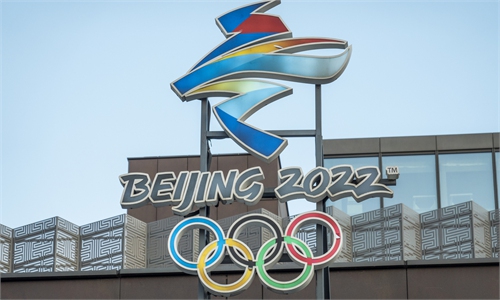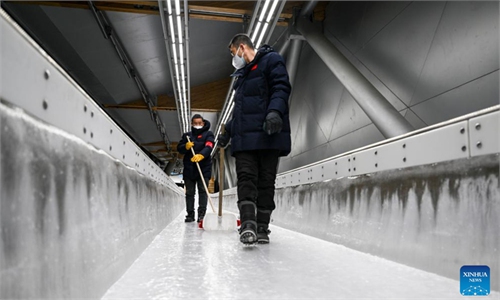
The Olympic cauldron outside the National Stadium, known as the Bird's Nest, in Beijing, is seen with the National Aquatics Centre in the background, after being lit by Torchbearer Zhang Junying after the opening ceremony of the Beijing 2022 Winter Olympic Games, on February 4, 2022.Photo:AFP
Editor's Note:The Beijing 2022 Winter Olympic Games will conclude on Sunday. Despite the Games being held in the special context of a raging pandemic, China has done its best to deliver its promise of hosting a streamlined, safe and splendid sport game. This has injected confidence and strength into the world amid the COVID-19 pandemic. What inspiring messages have the Games sent? What impressions has the event left on the world? Global Times solicited opinions from several foreign scholars.
Transcending politics to unite the world, strengthening long-term friendships
Rashid Alimov, a distinguished fellow at the Taihe Institute and former secretary-general of the Shanghai Cooperation Organisation
The Olympics can promote peace and cooperation. Sport should not be a tool for politics. It is already clear that those who attempt to politicize the Beijing Winter Olympic Games haven't achieved their goals. Some officials from some countries didn't attend the ceremonies of the Games, but this hasn't spoiled the world's celebration of sport at all. If someone is trying to stop China's development by taking this shameful step, they will not succeed. As a Russian saying goes, "the train has left the station."
The 2022 Winter Olympics in Beijing have once again confirmed China's impressive achievements in all areas, including sport. It is also worth recalling that Beijing is the first city in the history of the Olympics to host both the Summer and Winter Olympic Games. The Olympics have certainly been an inspiring event for millions of Chinese as well as for the world. I am sure that hundreds of thousands of young people in Asia have discovered winter sports thanks to the Games in Beijing. There is no doubt that the Beijing Winter Olympic and Paralympic Games will make an invaluable contribution to strengthening friendship, mutual understanding and harmony among people.
Carlos Martinez, co-editor of Friends of Socialist China
Far from being the diplomatic flop the US and its friends were hoping for, the Winter Olympics are a milestone on the road to a multipolar future, proof that the peoples of the world greatly value their friendship and mutually beneficial cooperation with China. Another outstanding feature of the Beijing Winter Olympics is that they are the greenest Olympics in history, and the first in which all sporting venues are powered exclusively with renewable energy. These green Games serve as a reminder that China has become a global leader in the struggle against climate breakdown. The Beijing Winter Olympics have also showcased China's world-leading COVID suppression strategy, via the closed-loop system which has ensured the participants are completely safe and not at risk of becoming infected.
Honoring promises to present a safe, green sport feast
Ei Sun Oh, a senior fellow at the Singapore Institute of International Affairs
These Winter Olympic Games signify China's renewed confidence while showcasing its profound achievements as a leading developing country. The insistence and emphasis on a green and clean Winter Olympic Games underscore China's commitment to sustainable development. This sort of voluntary assumption of responsibility toward sustainability lands China well as a role model for many other developing nations as they try to balance developmental needs and environmental preservation, against a background of undeniably worsening climate change that has caused many abnormal natural disasters.
These latest Olympic Games in Beijing have involuntarily been put into a position to demonstrate how to safely and productively work and progress in an environment where the pandemic periodically raises its ugly head both globally and locally. Pandemic precautions necessitate the physical sequestration of the athletes and other accredited Winter Olympics participants from the local population at large. But these are a frankly small price to pay for safety in times of pandemic distress. The precautions validate safely and successfully holding the Olympic Games, where athletes who trained for years or even decades can finally present their best in achieving the "higher, faster, stronger - together" ideals of the Olympics.
Gerge Hirthler, who has served as lead writer or senior communications strategist on ten international Olympic bid campaigns, including the 2008 Beijing Games.
Today, watching the Games on TV and knowing the extraordinary number of new "green initiatives" and environmental measures China has implemented for the Winter Games - under the IOC's demanding sustainability guidelines - I am struck by how clear the air is and how clean the settings appear. The blue skies are indeed symbolic of the immense environmental changes China has made to improve the quality of life for its people. The good news is that these Olympic-driven environmental changes will not simply serve the visitors who arrive for the 17 days of the Games, but will help improve the health of generations of Chinese to come.
And the benefits of China's Olympic-driven environmentalism reach well beyond the borders of the country. Today, China is the global leader in the development of green economy decarbonization for the planet. China ranks as a leading investor in low-carbon technologies and solar panels - initiatives that are driving the development of the green economy worldwide. If you look at the roots of those beneficial international trends, you might discover that it was the Olympic Games that ignited China's sustainable development overall.
Showing China as a modern, mature and responsible power on the global stage
Martin Jacques, a former senior fellow at the Department of Politics and International Studies at Cambridge University.
If the 2008 Summer Olympics marked China's dramatic arrival on the global stage, the 2022 Winter Olympics bear witness to the extraordinary decline of US influence over the 14-year period that separates the two events. If any further evidence of US decline is required in this context, take your mind back to the Moscow Summer Olympics in 1980 when, at the height of the Cold War, America staged a total boycott (athletes included) which amassed 66 countries.
If the story of the 2008 Olympics was all about Beijing and its new modernity, the story of these Olympics is about China's urban-rural divide and the challenge of transforming some of the poorest and most remote areas of the country and providing them with a state-of-the-art transport infrastructure ensuring their connectivity with the rest of China.
Sourabh Gupta, a senior fellow at the Washington-based Institute for China-America Studies
I have not the least doubt that China will pull off a safe and splendid Winter Olympics. Once China sets its mind to a difficult but achievable task, it does not shrink from persevering and bringing matters to the responsible and logical conclusion.
The Beijing Summer Games were indeed China's coming-of-age ceremony. Fourteen years later, the Winter Games find China as a settled, responsible, and increasingly successful middle-aged adult, but one nevertheless facing a number of steep challenges in this and the next phase of life ahead. These challenges cannot all be tackled in isolation by China. Successfully tackling them will require China to deepen its integration with the outside world, as much as it requires the outside world to gain a better appreciation of China.
Ken Hammond, professor of East Asian and global history at New Mexico State University
Demonizing the Beijing Winter Olympics is a sad example of America's desperate efforts to obscure China's achievements and stave off its own decline. The Olympic spirit of competition and friendship would be a much better path to follow. But for US political leaders, this seems to be something they cannot understand.



